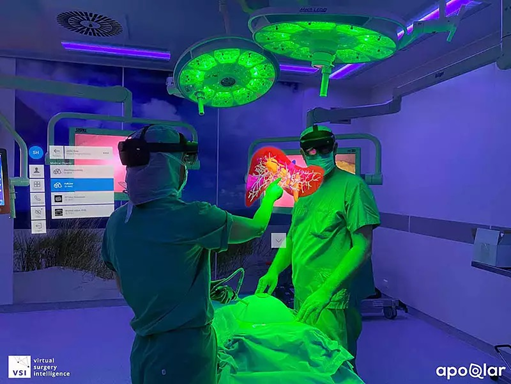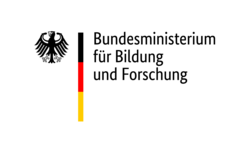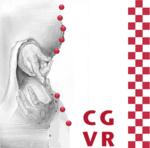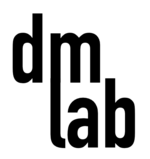BMBF-funded Project VIVATOP
BMBF-funded Project VIVATOP
Overall objective of the collaborative project
The aim of the project is to develop an immersive multi-user virtual and augmented reality application for operating theatre support. The focus will be on three scenarios: preoperative planning, the intraoperative phase and training. In our proposal, the use of the two modalities (VR and AR) depends on the scenario, but the core of the application should be context-independent. The application is always based on the same data, representation and interaction metaphors so that there is a consistent user experience across scenarios.
During planning, several users will be in a virtual room at the same time and will be able to interact with each other. In addition, real objects, especially organ models, will be integrated into the virtual space. In the intraoperative phase, a surgeon can use AR to communicate and interact with other remote colleagues during an operation, while they are connected via VR and receive an immersive impression of the current operation. The other two scenarios are used as a model for the training. To ensure that the scenarios described reflect reality, a user-centred design approach is chosen. During the iterative design process, the different target groups of the involved medical staff are therefore continuously involved.
More information about the project: www.technik-zum-menschen-bringen.de/projekte/vivatop
Aims of the sub-project of the University Department of Visceral Surgery
The University Department of Visceral Surgery of the Medical Campus of the University of Oldenburg at the Pius Hospital Oldenburg is responsible for developing realistic evaluation scenarios of the demonstrators to be developed. Within the framework of the evaluation, the workplace stress in the various scenarios of planned, complicative and emergency operations is to be determined. The aim is to measure the stress and workplace load of the operating theatre team situationally. This will be done by means of questionnaires (e.g. NASA-TLX) and fNIRS technology (functional near-infra-red spectroscopy). In addition, it will be evaluated to what extent VR/AR-supported preoperative planning and intraoperative AR use can lead to a reduction in stress and workload and thus increase patient safety.
The training scenarios developed will be evaluated by the university hospital with the help of the relevant stakeholders. Here, usability, immersivity and learning success are the focus of the investigations. Subjective measures (usability questionnaires, etc.) as well as objective measures (e.g. determination of the learning curve on the basis of the processing time for the scenarios and on the basis of the error rate) are used for this purpose.
In addition, the University Hospital for Visceral Surgery will be available to all project partners in a testing and advisory capacity for the entire duration of the project in the sense of a user-centred design process. To this end, continuous surveys of the context-specific requirements for the VR and AR components of the software will be conducted among the various stakeholders. Based on this, continuous adjustments to the specifications for functionality and interaction are made and discussed with the relevant project partners. In order to ensure that the system to be developed meets the requirements of surgeons and can thus be widely used in everyday life, a user-centred design approach is chosen that involves continuous exchange with the surgeons at the university hospital throughout the project.
VIVATOP presents partial results at "medical design" magazine
Research results from the VIVATOP project are presented as part of the theme week "In the OR of the Future" of the magazine medical design.
Prof. Weyhe was also interviewed about the possible applications of immersive technologies in the perioperative setting. The interview can be found here.
Virtual anatomy atlas
As preliminary work for this large collaborative project, the University Department of Visceral Surgery and the Computer Graphics Group of the Technology Centre for Informatics and Information Technology (TZI) have developed an Immersive Anatomy Atlas in a Virtual Environment.
The atlas has already been evaluated in two studies. The version of the atlas used for the study by Gloy et al., 20211 can be found here: youtu.be/JY50Wjh-olw
An older version of the atlas examined in Weyhe et al, 20182 can be seen here: https: //youtu.be/gGsLkDfxqLc
1 Gloy, K., Weyhe, P., Nerenz, E., Kaluschke, M., Uslar, V., Zachmann, G., & Weyhe, D. (2021).Immersive Anatomy Atlas: Learning Factual Medical Knowledge in a Virtual Reality Environment .Anatomical Sciences Education.
2. Weyhe, D. , Uslar, V.N., Weyhe, F., Kaluschke, M., & Zachmann, G. (2018) Immersive Anatomy Atlas - empirical study investigating the usability of a virtual reality environment as a learning tool for anatomy. Frontiers in Surgery











